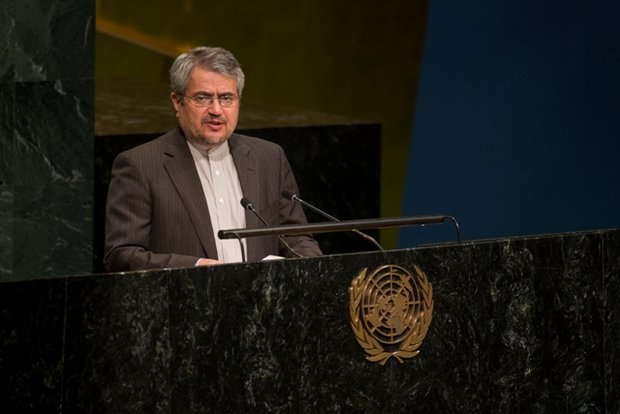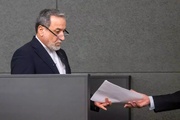Here is the full text of the statement by Khoshroo:
Mr. President
Allow me to begin by thanking Mr. Secretary-General for his report on the work of the Organization.
I would like to briefly touch upon some of the issues reflected in the report, which we find note-worthy:
In Paragraph 97 of his report, the Secretary-General welcomes the adoption of the JCPOA -known also as "the Iran Nuclear Deal" in the following way (and I Quote): “This historic accomplishment —a testament to the value of diplomacy — marks an important turning point in the international community’s relationship with the Islamic Republic of Iran and benefits nuclear non-proliferation. I am confident that this agreement will lead to greater mutual understanding and cooperation on the many serious security challenges in the region and beyond.” (end of Quote)
While we thank the Secretary-General for his realistic assessment of the value of the deal and its positive impact on our region and beyond, we invite the Secretariat to do its own positive share by taking a more constructive approach in fulfilling its reporting and monitoring functions. In our view, our full compliance with the terms of the deal and some non-performance by certain JCPOA participants, should be duly reflected in the reports by the Secretariat on the implementation of the deal.
Also on the issue of disarmament, we reiterate that the priorities of international community have not changed. Achieving the objective of nuclear disarmament is the highest priority. However, as the Secretary General has indicated in his report, the state of affairs is disappointing in this regard. As a result of persistent non-compliance by nuclear-weapon States with their obligations, there is no progress towards this objective. We are deeply concerned about this dangerous situation and its consequences for the international peace and security. There are thousands of nuclear weapons that threaten to annihilate humanity by accident or miscalculation or by madness. The only absolute guarantee against the use of nuclear weapons is their total elimination. We call on nuclear-weapon States to honor their special responsibility and legal obligations for accomplishment of total elimination of their nuclear weapons.
As the main sponsor of the General Assembly resolutions on "A World against Violence and Violent Extremism" (WAVE for short), we welcome the initiative by the Secretary-General to develop a Plan of Action to Prevent Violent Extremism. We think this is an important document, and could form the basis for further negotiations aimed to finalize a plan of action to be implemented by all Member States.
On the issue of human rights, we note the efforts by the Secretary- General and the Organization to further advance human rights and fundamental freedoms. However, the Secretariat should avoid trying to devise principles or set priorities and agenda, which are not agreed upon by Member-States. In this regard, we register our disagreement with the analysis presented in Paragraph 77 of the report on "death penalty", and the status attributed to the doctrine of "responsibility to protect" in paragraph 76.
On the issue of peacekeeping operations, it is quite clear that partnership and cooperation of Member States with the United Nations and their contribution to different activities of the UN is the prerequisite for the success of the UN in discharging its responsibilities, including in the area of peacekeeping. In this regard, we believe that the United Nation should be able to use potential capacity of the whole membership in peacekeeping operations, including troop, military, police and civilian. Therefore, the base of contributors should be broadened, and to this end any invitation by the UN requesting member states’ contribution to the UN peacekeeping missions or special political missions (SPMs) should be transparent and encompass all potential troop, police and civilian contributing countries.
On the issue of sustainable development, as stated in the report, the 2030 Agenda for Sustainable Development is built upon and expanded on the lessons learned from the Millennium Development Goals and other internationally agreed commitments. Hence, it should be noted that one lesson learned from the MDGs was that deviating from a commitment to partnership could lead to under-achievement. It is critical to keep international cooperation on the right track, especially in the first years of the 2030 Agenda’s implementation, which requires full and effective international support and solidarity.
As member states have set off the implementation of the 2030 Agenda, a strong and more dynamic United Nations development system, compatible to their needs and priorities, is of much significance. In this context, the forthcoming QCPR resolution should appropriately address a number of important issues including the existing imbalance between core and non-core resources, necessity of revitalizing governing bodies with equal participation and presence of member states, transparency, accountability, coherence and also exploring mechanism to avoid overlapping of the work across the UN agencies.
Mr. President,
The world today faces greater risks, but we are also endowed with greater opportunities. Let's join hands for a better and brighter future.
Thank you very much.
PT/PR


























Your Comment